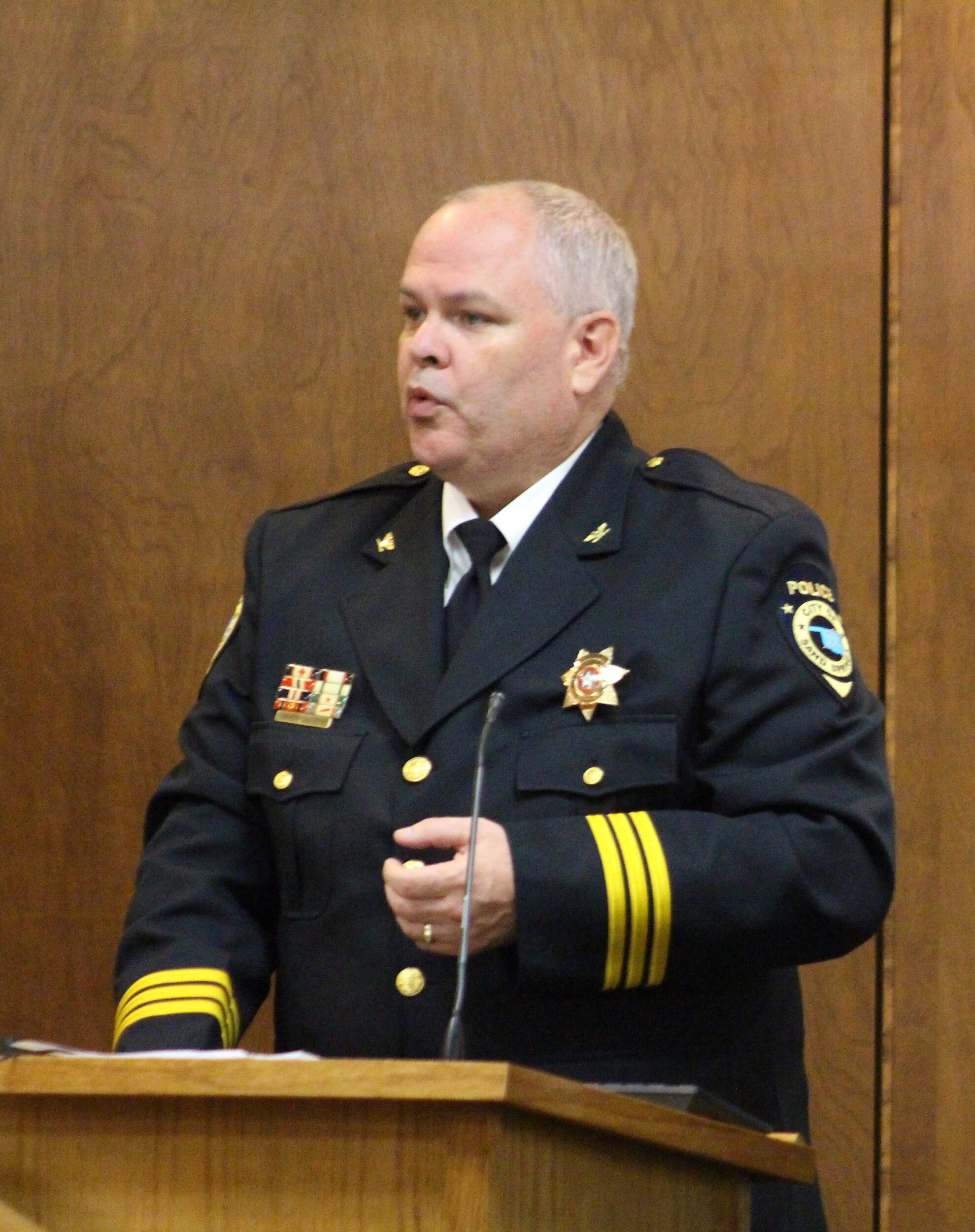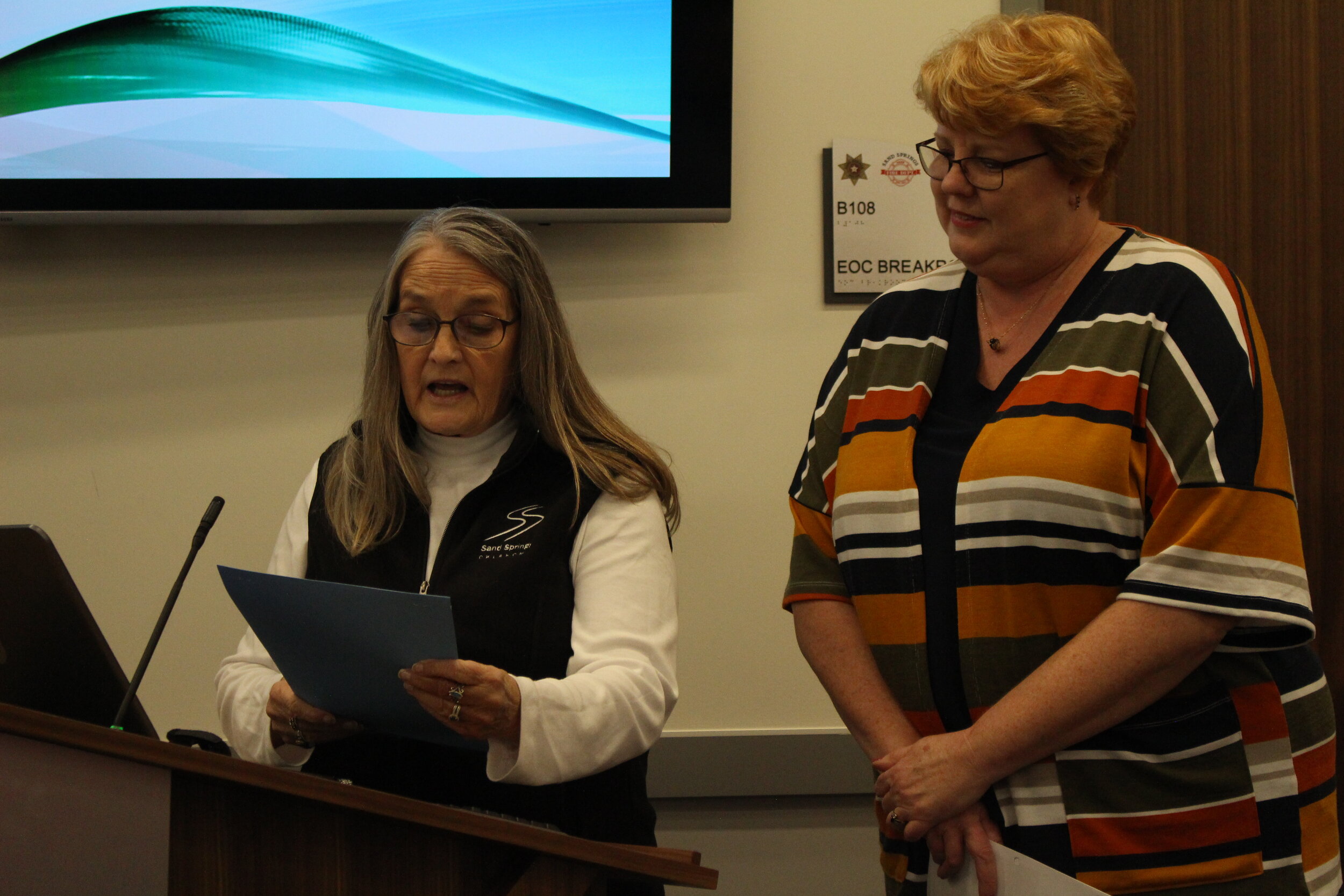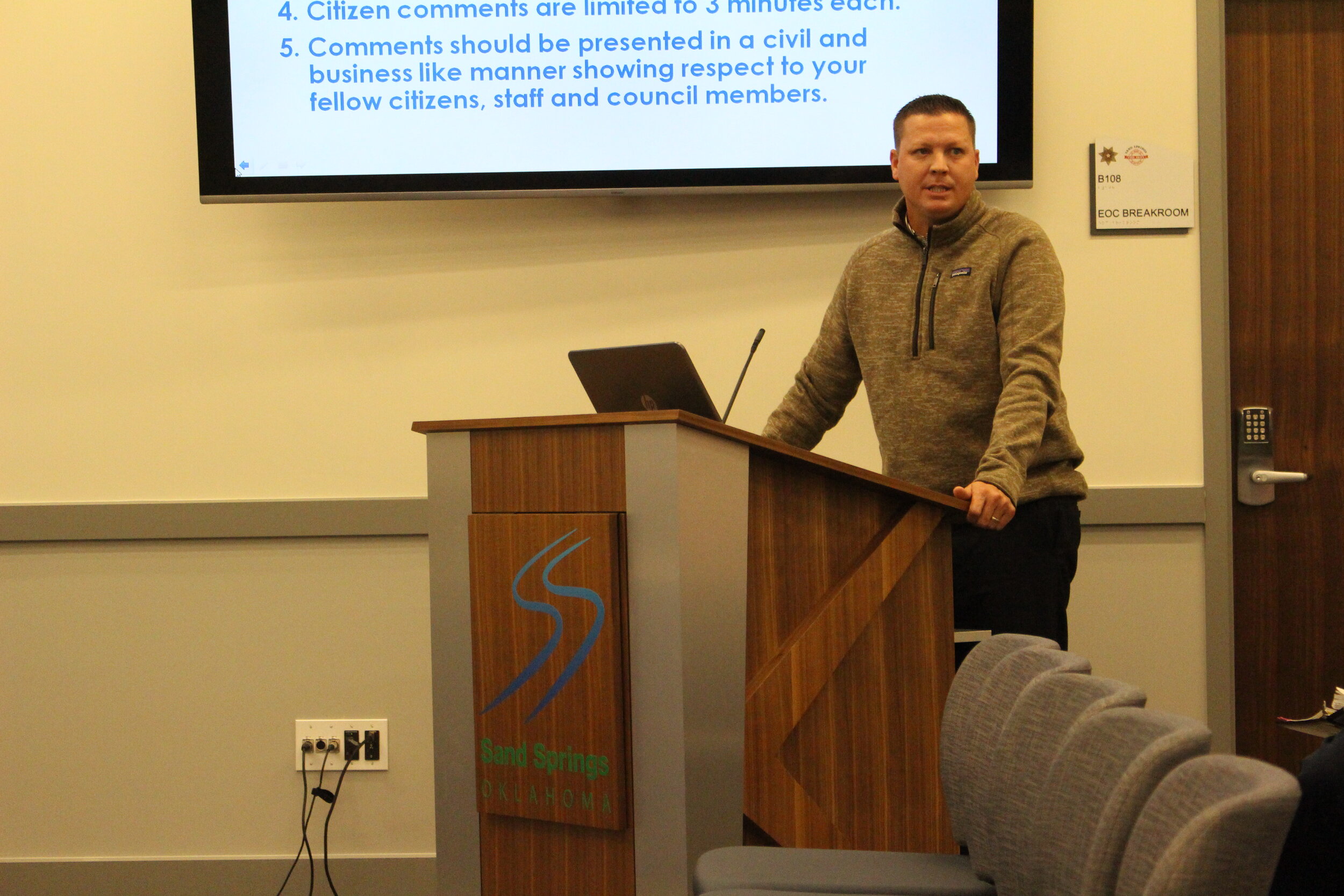More than a hundred Sandites attended a Black Lives Matter rally in Case Community Park Tuesday evening to listen to speakers, sing songs of unity, and to hold a candlelight vigil for victims of police brutality. The event was organized by two Charles Page High School alumni, Travis Allen and Imani Jennings, with support from the Sand Springs Police Department and the Sand Springs Ministerial Alliance.
District 73 State Representative Regina Goodwin, who represents Tulsa, praised the large number of white attendees who chose to support the event. She also spoke about recent state legislation, like House Bill 3515, which she authored, that would have required Oklahoma police officers to use body-cams. That bill died in committee. Another bill she authored, HB3519, addressed use of deadly and excessive force and also never made it out of committee.
“We need real hearts and minds to come together like this,” said Goodwin. “You have it within your wheelhouse, you have it within your heart to make a difference. I challenge you to do that in your household, with your relatives, with your small circle of friends. No question about it: when white folks get together, and black folks get together, and Hispanic folks get together, and Native Americans get together, and Pacific Islanders, everybody - we’re going to be better when we’re on the same page.”
“Remember this, on the other side of hate, there is hope. That is what I see here today. And beyond the hope, we want to move higher and higher to a better place for America.”
Tykebrean Cheshier spoke about the need for small towns to also get involved in the Black Lives Matter movement. “I feel like it’s super important for these other small areas to start getting involved, even if it’s an open forum or if it’s just a rally. Just something positive that they can bring to the community.”
Cheshier also spoke on the importance of voting, not just in presidential elections, but at the local level as well. “Your votes do matter. I think there’s a disconnect with the younger generation, thinking their votes don’t matter.”
Dr. Andre Fredieu offered a medical explanation behind the events that caused George Floyd’s death at the hands of Minneapolis police officer Derek Chauvin. Floyd was the subject of a recent viral video that showed Officer Chauvin kneeling on his neck for nearly nine minutes, even after Floyd had passed out. Police had been called on Floyd for allegedly using counterfeit money to purchase cigarettes. Chauvin has since been arrested and charged with second-degree murder, but only after weeks of protests and even riots across the country.
Fredieu asked the crowd to raise their arms for the duration of his nine-minute speech, so that they would get an understanding of just how long Chauvin had his knee on Floyd’s neck. He explained how the carotid artery and jugular vein control blood and oxygen flow to the brain, and how restricting them for even 15 seconds can cause your heart rate and blood pressure to drop. Fredieu is the Medical Director of the Oklahoma Stroke and Neurological Institute at Hillcrest Medical Center.
Mary L. Williams, a Tulsa minister, said that “2020 has been the greatest demonstration for dignity and equality for black Americans all around the world.”
“We recognize and must admit the need for change in our belief systems, in our court systems, in our economic system, in our education systems, because it is evident there are racial disparities. But as we address Black Lives Matter, we will in many ways address all things that matter.”
“Many have asked the questions, ‘well, police lives matter. Women’s lives matter. etc.’ Yes, we agree thoroughly…but Black Lives Matter is the subject matter so we are addressing that. Just as our good shepherd Jesus Christ taught us to go after the one sheep and leave the 99 behind when that one sheep is lost.”
She also commented on the need to continue supporting good police officers. “All of us in some way may have a relative who is a policeman. So we love our policemen. We love the justice system that stands up for justice.”
She went on to discuss issues of domestic violence perpetrated by police officers. “As we’re looking at how to deescalate the racial issues, we’re also looking at a wife. We’re looking at a mother. We’re looking at perhaps a husband who may be in the house with that man that wears a badge, or that woman that wears a badge, but they’re suffering police brutality.”
Williams also called on teachers to do a better job of finding equity in history when teaching, and to recognize the contributions of black Americans in science, politics, and the wars that defined America.
April Ghahagan led the crowd in singing “Lean on Me” by Bill Withers, and Alyxandria Fredieu recited “I Know Why the Caged Bird Sings” by Maya Angelou.
Reverend Mareo Johnson, the Senior Pastor at Seeking the Kingdom Ministries, and founder of the Tulsa Chapter of Black Lives Matter spoke on what exactly “Black Lives Matter” means. “It doesn’t mean that black lives are more than any other life. But what it means is that for all lives to matter, black lives have to matter too.”
“When we say black lives matter, it doesn’t mean just when police shoot unarmed black women and men. It means that when we do ourselves wrong…black lives have to matter to black people as well. Black Lives Matter is not just about police shooting blacks. It’s way more than that. It’s education. It’s economic development, public safety, unity. It’s loving one another, forgiving one another. It’s about all of that.”
Sand Springs Police Chief Mike Carter did a Q&A session with the crowd and explained many of the department’s policies and changes over the past several years.
Carter expressed his concerns about calls for an end to Qualified Immunity. Qualified Immunity is a legal doctrine that offers police and other officials protection from civil lawsuits. Libertarian congressman Justin Amash recently introduced legislation to end Qualified Immunity, and House Resolution 7085 has now drawn tripartisan support.
“Every police officer was a little bit nervous about that, because if you think about the job we do, the split-second decisions that have to be made, sometimes that’s going to be a problem if your family’s future or your life savings is in the balance every day you go to work. Sometimes it’s not even for the actions that you took. I take this one personal because as the Chief, I’m responsible even if I wasn’t there. Generally, Qualified Immunity serves a purpose…but that doesn’t mean that we shouldn’t try to hold officers and employees accountable for what we do. Qualified Immunity isn’t just a total defense. I think it was a misnomer that it’s just a blanket immunity for anything that we want to do.”
One question addressed the “8 Can’t Wait” campaign. The project, launched by Campaign Zero, advocates for eight policies that departments can use to curtail police violence.
Ban chokeholds and strangleholds.
Require de-escalation.
Require a warning before shooting.
Require that all alternatives be exhausted before shooting.
Require officers to intervene when excessive force is being used.
Ban shooting at moving vehicles.
Establish a Force Continuum.
Require comprehensive reporting.
Carter referred to the city’s annual Community Policing Plan, which is in its fourth iteration. The plan received the 2018 International Associations of Chiefs of Police - Leadership in Community Policing Award. “We didn’t start today. We didn’t start when George Floyd lost his life. This agency started five years ago. When the (Department of Justice) put out the Ferguson Report this agency started looking at reforms and put them into practice. The 8 Can’t Wait campaign is going to go into that. It’s something we’re evaluating…I think we do six of the eight right now, and we’re looking at the other two.”
One of the questions asked Carter to address individuals who support police to the point of fault. Carter responded that “If you’re not supporting right, you’re on the wrong side. We’ve got to quit supporting things based on Republican, Democrat, black, white, anything else. We’ve got to start supporting what’s right.”
“I didn’t sign on as a police officer to protect white people. I didn’t sign on to protect black people. I didn’t sign on to protect men or women. I signed on to protect people, and that’s what it needs to come back down to.”
Another question asked how much riot gear the Sand Springs Police Department has. “We don’t have riot gear,” answered Carter. “Because we’re going to help with the Presidential event over in Tulsa (on June 20th) we ordered some pepper balls. We think pepper balls as a less lethal option help us not resort to that. But as far as riot shields, helmets, and other things - we’re just not equipped for that. I think if you run a police department, and our men and women conduct themselves the way we should, the chances of needing riot gear in Sand Springs, Oklahoma are pretty minimal.”
Carter addressed the recent movement to defund the police. “If we’re talking about getting rid of police in America all the way, I can’t support that and I don’t think very many people could. But when you talk about taking away responsibility for mental health calls from police officers and putting it with mental health professionals, I think just about every police officer in America would be supportive of that.”
Carter said that when the initial Policing Plan was put together, it was based on what Ferguson Police did wrong leading up to, and during, the 2014 protests and riots. He said they also looked at Black Lives Matter demands to see if there were any reforms they could make.
Carter also shared a recent experience with black community members. “I had a situation last week where a mother brought her twelve-year-old child to my office. Made an appointment, wanted to see me, and wanted me to know him because she was scared as he’s a black child that he was going to be walking down the street, and what would he encounter.”
“That’s not what I signed on for. I didn’t sign on to make people scared of us. Our officers didn’t sign on to have people be afraid of us because they feel that they’re a person of color and they can’t walk down the street. We need that child to be happy in our community.”
One of the department’s efforts to improve community relations is a reduction in traffic citations. Two-thirds of traffic stops result in a warning in Sand Springs. Carter says the department is happy to arrange for Uber or Taxi rides for citizens who are too drunk to drive home. The department was one of the first in the state to mandate body cameras.
SSPD has signed a memorandum of understanding with the Oklahoma State Bureau of Investigation so that the department doesn’t investigate its own shootings and in-custody deaths. There is also a civilian review board for all use of force instances. The department also answers calls from undocumented immigrants without turning victims of crimes over to Immigration and Customs Enforcement.
Carter says that all Sand Springs officers go through Fair and Impartial Police Training, and Anti-Bias Training. “All of our officers have been through Deescalation Training. All of our officers have been through Crisis Intervention Team Training.”
“This is a direct result of Mr. George Floyd’s death, we’re going to do mandatory re-training with our people on positional asphyxiation and excited delirium. We’re going to use humane leg restraints and training.”
“We already banned chokeholds, except in cases of deadly force. We already require not only a duty to report officer excessive use of force, but the officer is required to intervene, to stop the excessive use of force. We have a ban on shooting at moving vehicles, unless it’s a last resort.”
Click here to view the Sand Springs Police Department’s website, which includes the full existing Policing Plan, and a page to submit ideas for 2020 plan.
Chief Carter also praised the event organizers and expressed his support for the rally. “We ought to be able to get together as people and talk about issues without there being fear. I want to thank Imani and Travis for what they’ve done. It took a lot of courage…there were people that were saying nasty things online and questioning whether this needs to happen. Getting people together and having a discussion should never be a basis for people being upset.”









